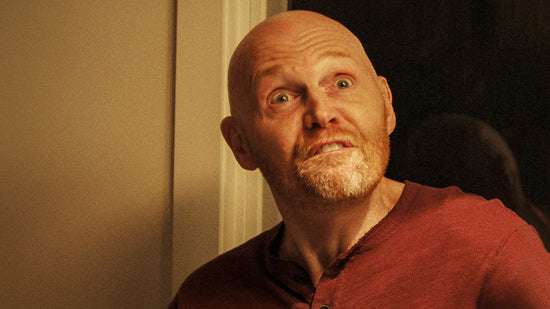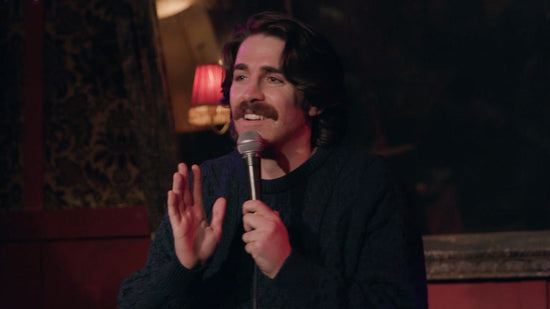Situated somewhere between anti-comedy and not, Gavin Matts explores the human condition as he perceives it in his special, progression. To be clear, anti-comedy doesn’t mean “no jokes,” but Matts doesn’t seem to be as keenly interested in crushing as he does getting as close to a sense of honesty as he can, while still performing comedy. The direction signals this, since it’s partly directed from the perspective of a potential audience member, but also can’t resist the classic side-shots of Matts performing from stage height, or capturing him as he runs his hand through his hair over, and over, and over again. In this sense, we get an idea of the struggle Matts is engaging with in his attempt to wrestle truth into comedy as the world around him gets worse.

Gavin Matts is trusting the audience to meet him where he is.
One of the most interesting and impressive elements of the special is the consistent delivery of material with the cadence of comedy. There’s a quiet that can be heard in the set, with Matts talking to the audience in almost a whisper at times, like he’s sharing something with himself in the dark. Taking long pauses, Matts speaks plainly, at times semi-incohesively, but trusts his audience is with him. For example, he shares this:
“I try to stay positive, I really do, but it’s hard because other people exist. There’s like so many…not you guys…not you, but them. And then when you see them, you’ll be like ‘you.’ Like, I watched a man blow his nose into his hand. You’re like ‘oh, what was in his hand?’ It was just more hand. ‘What was in his hand,’ more hand. And then he flung it in one motion. I was like, oh, he’s done this before. Yeah, he’s done that before. I’m seeing this person’s habits in real time. There’s way too many people. I shouldn’t see your habits. You know, I should have to know you deeply and intimately, and then weigh the pros and cons of that habit, and ultimately choose I don’t want you in my life. I shouldn’t have habits forced on me.”
To keep up with the joke, one really has to pay attention. The joke of you/them switching to them/you in the first part of the joke before the example of a man blowing his nose in his hand is smart, but also has larger resonance to Matts’s goals in the act. The ending, which is also heady, is delivered conversationally, and it shows real confidence that there’s such trust in the audience to receive it as comedy. If Jerrod Carmichael is the best at this type of comedy, Drew Michael, Rami Yusef, are often in the conversation of great comedy interested in changing the definition of the art form. With this special, Matts makes a good case for himself to be included in that dialogue.
In not chasing comedy, Matts is free on stage.
In giving the audience more credit, Matts is free of the confines of joke patter, cadence, and timing, and lands in a place where he can (seemingly) free-associate. At times in Progression, it feels like you’re in free-fall with Matts, as he moves from one topic to the next with no transition, save for a pause that seems to stretch for minutes. What he offers is sometimes right in the obvious space of comedy, and sometimes a stray observation that whiffs without problem. Consider these two jokes:
“Like I think the people that have kids now, it’s just for Instagram. It’s just for somebody who could never get 100 likes before, and now they’re like ‘maybe with this baby, I can get the kind of page activity I always wanted. People didn’t like me for me, maybe they’ll like me for me and my baby. Dress my baby up like a bear, you know, do a phot shoot in the woods for some reason. Look back at the baby real scared. ‘My baby’s a good actor. 121 likes. Worth it. Worth it. Worth the greatest pain of my life.’”
“Good people have good skin. Good people have great skin.Somebody with great skin, you’re like, ‘you do charity work.’ Evil people? Awful skin.That’s who a three-in-one shampoo conditioner body wash is for.”
In the first bit, the audience responds to all of the jokes and ideas of jokiness that Matts hints at, since it more easily takes the form of a fully fleshed-out idea. In the latter, there’s laughter, but since it’s somewhat of an errant concept, the audience isn’t sure how to place it in context to other, more fully-formed ideas. However, there’s an engagement with Matts that’s akin to an episode of Hot Ones, where the audience is along for the ride, even if they’re not sure what to do along the way all of the time.
Matts has found something to get excited about in this special.
By creating an atmosphere where observations like these two jokes get the full gesture of Matts’s pauses and vulnerability, he’s on to something exciting about what stand-up can be and should take a chance to become. Rather than soften the edges, Matts is bringing his full self to the stage, mess and all, and hopes the audience will try to figure it out with him. In an era where stand-up can feel especially desperate or boring, Matts is trying to argue that there’s a better way to be on stage. He trusts audiences to understand when he says, “Like I remember that I got into a revolving door, with another man, Just sharin’ a grate. Just splittin’ a quarter. And I just said, ‘I’m here too.’” He’s not wrong to do so.
Gavin Matts' newest comedy special, progression, is streaming now on All Things Comedy's YouTube channel. Buy the audio album from the special available on 800 Pound Gorilla!









